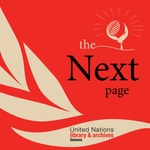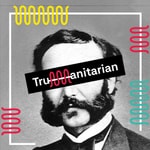The Next Page – Details, episodes & analysis
Podcast details
Technical and general information from the podcast's RSS feed.

The Next Page
United Nations Library & Archives Geneva
Frequency: 1 episode/14d. Total Eps: 159

Recent rankings
Latest chart positions across Apple Podcasts and Spotify rankings.
Apple Podcasts
🇫🇷 France - government
10/07/2025#90🇫🇷 France - government
09/07/2025#76🇫🇷 France - government
08/07/2025#70🇫🇷 France - government
07/07/2025#61🇫🇷 France - government
06/07/2025#54🇫🇷 France - government
05/07/2025#46🇫🇷 France - government
04/07/2025#38🇫🇷 France - government
03/07/2025#26🇫🇷 France - government
02/07/2025#15🇫🇷 France - government
01/07/2025#69
Spotify
No recent rankings available
Shared links between episodes and podcasts
Links found in episode descriptions and other podcasts that share them.
See all- https://www.silvermansound.com
6329 shares
- https://sdgs.un.org/goals
148 shares
- https://www.youtube.com/
4160 shares
- https://youtu.be/
92 shares
- https://youtu.be/wUdt7ziY0V0
4 shares
RSS feed quality and score
Technical evaluation of the podcast's RSS feed quality and structure.
See allScore global : 58%
Publication history
Monthly episode publishing history over the past years.
Informing Interwar Internationalism: The League of Nations Information Service
Episode 130
vendredi 30 août 2024 • Duration 39:15
In this episode, Emil Seidenfaden, an historian presently undertaking postdoctoral research at the Saxo Institute, University of Copenhagen, joined us to talk about his recent book, Informing Interwar Internationalism.
This fascinating work combines international history and media history and explores the intersection of journalism and diplomacy at the time of the League of Nations.
Emil talks about the relationship between public information and legitimacy, and how the Information Section officials at the League negotiated the tensions between propaganda, public opinion and internationalism.
Resources
Seidenfaden, E. E. (2024). Informing Interwar Internationalism: The Information Strategies of the League of Nations. Bloomsbury Academic. Histories of Internationalism
Seidenfaden, E. E. (2020). Daniel Hucker, Public Opinion and Twentieth-Century Diplomacy. A Global Perspective. Leiden: Brill.
Potter, S. J. (2023). Broadcasting in the Cause of Peace: Regulating International Radio Propaganda in Europe, 1921–1939. The International History Review, 45(6), 843–864. https://doi.org/10.1080/07075332.2023.2224352
Sweetser, A. (1916) Roadside Glimpses of the Great War. Macmillan. London.
Covenant of the League of Nations: https://libraryresources.unog.ch/ld.php?content_id=32971179
The League of Nations Information Section: https://libraryresources.unog.ch/LONSecretariat/information
Emil’s book recommendation:
Cohen, D. (2023). Last Call at the Hotel Imperial. The Reporters Who Took On A World At War. Penguin Random House.
Where to listen to this episode
- Apple podcasts: https://podcasts.apple.com/us/podcast/the-next-page/id1469021154
- Spotify: https://open.spotify.com/show/10fp8ROoVdve0el88KyFLy
- YouTube:
Content
Guest: Emil Seidenfaden
Host, producer and editor: Amy Smith
Recorded & produced at the United Nations Library & Archives Geneva
Henri La Fontaine, un enragé de la paix avec Pierre Van den Dungen
Episode 129
vendredi 16 août 2024 • Duration 54:00
Pour cet épisode, nous sommes enchantés d’accueillir Pierre Van Den Dungen pour parler d’Henri La Fontaine, un homme intense et fascinant gratifié du prix Nobel de la Paix en 1913.
Pierre Van Den Dungen, docteur en Philosophie et Lettres (Histoire), a consulté la totalité des papiers personnels de La Fontaine au Mundaneum, à Mons, afin de rédiger la biographie intitulée « Henri La Fontaine, prix Nobel de la Paix 1913 : une vie » publiée aux Editions Samsa en 2022. Pierre Van Den Dungen nous présente les grandes lignes de la personnalité de La Fontaine, en mettant en lumière son entourage, ses réseaux et sa sphère intime. Il explore ensuite les convictions pacifistes et mondialistes de La Fontaine, ainsi que son long mandat de 36 ans à la présidence du Bureau international de la Paix. Il traite également de la période de la vie de La Fontaine durant la Première Guerre mondiale, de son implication au sein de la Société des Nations, pour finalement évoquer les dernières années de sa vie durant la Seconde Guerre mondiale.
Ressources
Van den Dungen, Pierre. (2022) Henri La Fontaine, prix Nobel de la Paix 1913 : une vie. Bruxelles. Editions Samsa. https://www.henrilafontaine.be/ouvrage/henri-la-fontaine-2/
Rencontre avec Pierre Van Den Dungen : https://www.henrilafontaine.be/2023/01/07/chaire-hlf-rencontre-avec-pierre-van-den-dungen/
Fondation Henri La Fontaine : https://www.henrilafontaine.be/la-fondation/
Mundaneum : http://www.mundaneum.org/fr
Discours d’Henri La Fontaine, 8ème séance plénière de la première Assemblée de la Société des Nations, 20 novembre 1920 (p. 171 du PDF) : https://archives.ungeneva.org/the-records-of-the-first-assembly-plenary-meetings
Description des archives du Bureau International de la Paix (1891-1951) : https://archives.ungeneva.org/international-peace-bureau
Où écouter cet épisode
- Apple podcasts: https://podcasts.apple.com/us/podcast/the-next-page/id1469021154
- Spotify: https://open.spotify.com/show/10fp8ROoVdve0el88KyFLy
- YouTube: Henri La Fontaine, un enragé de la paix avec Pierre Van den Dungen (youtube.com)
Contenu
Invité : Pierre Van den Dungen
Hôte : Hermine Diebolt
Réalisation : Amy Smith
Enregistré et réalisé à la Bibliothèque & Archives des Nations Unies à Genève
Building Peace that Lasts - a conversation with Itonde Kakoma
Episode 120
vendredi 15 mars 2024 • Duration 44:44
We invited Itonde Kakoma, the new President and CEO of Interpeace, to talk about the mission of Interpeace – an organization that had its origins in the UN and works to prevent violence and build lasting peace. Interpeace has over 30 years of experience working in Africa, the Middle East, Asia, Europe and Latin America.
In this conversation with the Director of the UN Library & Archives, Francesco Pisano, Itonde Kakoma talks about inclusive peacebuilding, a participatory approach and a vision of peace anchored in the cohesion and resilience of citizens, the diversity and inclusion of communities and the responsiveness and trustworthiness of State institutions. They discuss the obstacles around implementing the strategic aims of rethinking peace, enhancing resilience and embedding peace, as well as the nexus between peacebuilding and multilateralism.
Resources
Interpeace website: https://www.interpeace.org/
Where to listen to this episode
- Apple podcasts: https://podcasts.apple.com/us/podcast/the-next-page/id1469021154
- Spotify: https://open.spotify.com/show/10fp8ROoVdve0el88KyFLy
- YouTube: https://www.youtube.com/
Content
Guest: Itonde Kakoma, President, Interpeace
Host: Francesco Pisano
Producer: Amy Smith
Editing and social media designs: Mengna Chen
Recorded & produced at the United Nations Library & Archives Geneva
32: Historian Margaret MacMillan on the shaping of modern multilateralism
Episode 36
mercredi 7 octobre 2020 • Duration 49:02
In Episode 32, historian, author and professor of history, Margaret MacMillan, joins The Next Page to share some of her insights on the makings of multilateralism as we know it today.
What are some of the roots of modern multilateral cooperation? How did individuals and institutions promote and build multilateralism, and how did they work to spread their ideas? What is the role of public opinion, and has this changed over time? Professor MacMillan shares some fascinating insights into these questions and more, looking at the beginnings of modern multilateralism in the 19th century, to the creation of the first global multilateral organization, the League of Nations, and the post-1945 era with the beginning of the United Nations. As we mark 100 years of multilateralism in Geneva, she also reflects on the evolution of multilateralism over the years, as well as a few thoughts on the multilateralism of the future.
As an avid reader and writer of many books on history, she also shares a glimpse of her most recent book, War: How Conflict Shaped Us, soon to be released on 6 October 2020, and a few tips on how she approaches the writing process. Hope you enjoy this listen as much as we did!
About Professor Margaret MacMillan
Margaret MacMillan is a Professor of History at the University of Toronto and emeritus Professor of International History and the former Warden of St. Antony's College at the University of Oxford. To learn more about her, visit: http://www.margaretmacmillan.com/Bio.php
To explore her full collection of books, including Paris 1919: Six Months that Changed the World (2001); The War that Ended Peace (2014); History’s People (2015); and War: How Conflict Shaped Us (2020), visit her website: http://www.margaretmacmillan.com/index.php
Further Resources
- Access the episode transcript here: https://bit.ly/33gBtic
- To find out more about 100 years of Multilateralism in Geneva, visit: https://multilateralism100.unog.ch/front
- The UN Geneva Library & Archives also has a Research Guide on multilateralism! Find out more here: https://libraryresources.unog.ch/multilateralism
- And, view some of Margaret MacMillan's books here at the Library: https://bit.ly/3456R24
Content
Speakers: Margaret MacMillan & Natalie Alexander
Host & Editor/Producer: Karen Lee & Natalie Alexander
Editorial Guidance: Pierre-Etienne Bourneuf, Scientific Advisor at UN Geneva Library & Archives
Images: Ander McIntyre
Social media designs and transcript: Karen Lee
Recorded & produced at the UN Geneva Library & Archives
31: Dr. David Nabarro on the Impact of COVID-19 on Agenda 2030
Episode 35
vendredi 18 septembre 2020 • Duration 43:48
Welcome to The Next Page podcast. The UN Geneva Library & Archives are back from summer break, with lots of projects coming up in the next few months. Keep up-to-date over at our Twitter and Facebook pages.
In Episode 31 we are joined by Dr. David Nabarro, one of six Special Envoys to the Director-General of the World Health Organization (WHO) for the current COVID-19 crisis, and the Strategic Director at 4SD (Skills, Systems and Synergies for Sustainable Development).
In conversation with our Director Francesco Pisano, David shares his unique insights on the current pandemic, its many challenges, but the largely hopeful vision he has for the future. Speaking from decades of service as a medical doctor, special envoy, and strategic director at 4SD, Dr. David Nabarro takes us through the present pandemic, but more importantly, points us to the future, and the collective cooperation we must all champion.
We also hear his thoughts on the ways in which he believes COVID-19 will affect Agenda 2030, and the various implications that the virus will have on our path to achieving the sustainable development goals.
Resources
Learn more about David and 4SD: https://www.4sd.info/
Learn more about Agenda 2030 and the 17 sustainable development goals: https://sustainabledevelopment.un.org/post2015/transformingourworld
Access the episode transcript here: https://libraryresources.unog.ch/audio/davidnabarro
Content
Speakers: David Nabarro and Francesco Pisano
Host & Editor/Producer: Karen Lee
Images: UN/UNAIDS/David Nabarro (Twitter).
Graphics, social media designs and transcript: Karen Lee
Recorded & produced by the UN Geneva Library & Archives
30: Corinne Momal-Vanian, new Executive Director of the Kofi Annan Foundation
Episode 34
vendredi 4 septembre 2020 • Duration 42:44
Welcome to The Next Page podcast. The UN Geneva Library & Archives are back from summer break, with lots of projects coming up in the next few months. Keep up-to-date over at our Twitter and Facebook pages.
In Episode 30 we are joined by the new Executive Director of the Kofi Annan Foundation, Corinne Momal-Vanian, who recently joined the Foundation after more than 30 years at the UN, including her most recent post as Director of the Division of Conference Management at UN Geneva.
In conversation with our Director Francesco Pisano, Corinne shares about her new role and the work and values of the Kofi Annan Foundation. She also shares her reflections on multilateralism and the current state of the UN today, including some of the challenges its facing, as well as opportunities for how the UN can move forward as we look to multilateralism in the future.
We also hear her thoughts on women, gender equality and parity, and leadership in international organizations, and the values she’s inspired by from some of our past and present leaders here at the UN. For more inspiration and learning, head to the links below.
Resources
Learn more about Corinne and the Kofi Annan Foundation: https://www.kofiannanfoundation.org/member/corinne-momal-vanian/
Access the episode transcript here: https://libraryresources.unog.ch/c.php?g=673332&p=4880979&t=15286
Other Podcast Episodes
Listen to Episode 4: Conversation on Innovation in International Organisations with Tina Ambos and Corinne Momal-Vanian
Listen to Episode 19: Former President of the Kofi Annan Foundation on his book A Peacekeeper in Africa, Learning from UN Interventions in Other People’s Wars.
Listen to Episode 20: Conversation with Catherine Bertini on Leading Transformational Change in International Organizations
Check out the Library Research Guides on Women and Gender Equality and Women and Global Diplomacy.
Content
Speakers: Corinne Momal-Vanian and Francesco Pisano
Host & Editor/Producer: Natalie Alexander
Images: Kofi Annan Foundation
Graphics, social media designs and transcript: Karen Lee.
Recorded & produced by the UN Geneva Library & Archives.
29: Kartik Sawhney on the intersection of accessibility, education and entrepreneurship, and the power of working together #KnowledgeRising
Episode 33
vendredi 21 août 2020 • Duration 43:10
Our Knowledge Rising series is particularly focused on young activists, knowledge-shapers and change-makers. In this episode, we are joined by young activist and UN Young Leader for the Sustainable Development Goals, Kartik Sawhney, who shares about his ongoing work in accessibility, education and entrepreneurship. As a disability advocate and technologist, Kartik has worked to redefine the term “impact” in accessibility, empowering other people with disabilities to be successful in their own pursuits in technology and innovation.
A computer science graduate of Stanford University, Kartik co-founded I-Stem (previously called Project StemAccess), which provides technical training, mentorship and hands-on opportunities to people with disabilities around the world. As the first blind student to pursue science education in high school in India, he also advocated for accessible and equitable education for other students with disabilities in the country. He is currently a software engineer/AI scientist at Microsoft where he works with the Cortana Team, the company’s virtual assistant. In this conversation, Kartik shares about his unique activism at the intersection of accessibility, education and entrepreneurship, his personal experience as a blind person, and the important role of multilateralism — at the level of individuals, companies and nations —in the fight for accessibility. Suggesting different ways in which we can all help to make a difference, Kartik emphasises the need to work collectively together to achieve truly transformational impact.
Resources:
- Podcast transcript: https://bit.ly/2CS0Vjp
- Engage with Kartik and the rest of the team at I-Stem: https://www.inclusivestem.org/
- More on Kartik:
-
- UN Young Leaders for the Sustainable Development Goals: https://www.un.org/youthenvoy/kartik-sawhney/
- UN Exclusive Interview with Kartik: https://www.un.org/sustainabledevelopment/blog/2019/01/exclusive-interview-kartik-sawhney/
- LinkedIn: https://www.linkedin.com/in/kartiksawhney
Readings:
- 2015 study on digital capital and its relationship with disabled students: https://www.sciencedirect.com/science/article/abs/pii/S0360131514002541
Content:
Speakers: Kartik Sawhney
Host & Editor/Producer: Karen Lee
Images: Medium Blog
Recorded & produced by the UN Geneva Library & Archives.
28: Ahmed M. Badr on youth, storytelling and transcending displacement through creative expression #KnowledgeRising
Episode 31
mercredi 22 juillet 2020 • Duration 41:23
This episode continues our Knowledge Rising series, which is dedicated to conversations with young people – activists, knowledge-makers, change-makers – on their work and their views on the issues they’re passionate about.
Today, more than 1 per cent of the world’s population, around 79.5 million people, are displaced. This is according to the latest Global Trends Report by UNHCR, the UN Refugee Agency, and is the highest total the Agency has ever seen.
But displacement is much more than statistics. In this episode we’re joined by Ahmed M. Badr, one of the UN Young Leaders for the Sustainable Development Goals. He’s a writer, multi-media artist, a social entrepreneur and a former Iraqi refugee. He’s now a graduate of Wesleyan University and the founder of Narratio, a platform for youth empowerment through creative expression.
Ahmed shares about his work at Narratio and his interest in the intersection of creativity and youth, particularly youth who’ve been displaced. He underlines the importance of creating spaces for them to tell their own stories, to transcend the circumstances that caused the displacement and to claim their own stories that really move beyond the numbers and the data we often see associated with refugees and displaced persons. Moving forward, he also shares his views on how creativity and multilateralism have much to learn and gain from each other.
Resources
- Podcast: Resettled, hosted by Ahmed, by VPM (Virginia's NPR and PBS station): http://vpm.org/resettled
- Podcast: A Way Home Together, Stories of the Human Journey, formerly hosted by Ahmed: http://ahmedmbadr.com/awht-podcast
- Narratio, a global platform for youth empowerment through creative expression: https://narratio.org/
- While The Earth Sleeps We Travel, combining Ahmed's own poetry with the personal narratives and creative contributions of young refugees, available 13 October 2020: https://www.earthsleepswetravel.com/
- Find Ahmed at his website: http://ahmedmbadr.com/, on Twitter at https://twitter.com/uBadrand on Instagram: https://www.instagram.com/mesopotami/
Content:
Speaker: Ahmed M. Badr
Host & Editor/Producer: Natalie Alexander.
Images: Ahmed M. Badr, Edward Grattan and Bob Zurr.
Recorded & produced by the UN Geneva Library & Archives.
27: Jerome Bellion-Jourdan on negotiations for the greater good
Episode 30
vendredi 3 juillet 2020 • Duration 34:28
This episode delves into the world of negotiation. As we mark 100 years of multilateralism in Geneva and the UN turns 75, what is the role of negotiation in the multilateral context? For this conversation, we’re joined by Jerome Bellion-Jourdan for an online recording. He’s currently a Senior Fellow at the Global Governance Centre at the Graduate Institute in Geneva, and before that he served as the lead EU negotiator on a range of thematic issues such as Business and Human Rights as well as country situations in the UN Human Rights Council for almost 9 years. In this conversation, he shares insights into negotiating at the multilateral level, but also some opportunities he sees for change and evolution in the practice of negotiation to address global challenges.
He is currently working to explore the potential for an initiative which would provide the space to experiment new formats of negotiations with notably the use of technology to make them more inclusive, and to foster negotiations towards the greater good. He is supported by a team of individuals from international organisations, governments, business, civil society and others contributing pro bono to prepare for a first experiment of a “virtual and inclusive negotiation for the world after COVID-19”. He also shares on some tips on how we can all bring more inclusive conversations and negotiations into our own fields and daily lives.
Here below are some resources from the conversation and more.
Resources on the project for an international negotiation platform (Global Governance Centre at the Graduate Institute in Geneva)
- Exploring the potential for an international negotiation platform (including access to a survey for listeners interested to complete) https://graduateinstitute.ch/communications/news/exploring-potential-international-negotiation-platform
- Preparation for the experiment of "a virtual and inclusive for the world after the COVID-19 outbreak": see more at the Blog & LinkedIn page to contact Jerome Bellion-Jourdan.
Readings:
- Multilateralism: the Anatomy of an Institution, by John G. Ruggie. International Organization, Vol. 46, No. 3 (Summer, 1992), pp. 561-598 https://scholar.harvard.edu/files/john-ruggie/files/multilateralism.pdf
- Getting to Yes with Yourself (and other Worthy Opponents), by William Ury. New York: HarperCollins Publishers, 2015, 256p. https://www.williamury.com/books/getting-to-yes-with-yourself/
- The UN Human Rights Council. A Practical Anatomy, by Eric Tistounet. Cheltenham: Edward Elgar Publishing, 2020, 384p. https://www.e-elgar.com/shop/gbp/the-un-human-rights-council-9781789907933.html
Content:
Speaker: Jerome Bellion-Jourdan.
Host & Editor/Producer: Natalie Alexander.
Images: UN Geneva Library & Archives, Jerome Bellion-Jourdan.
Recorded & produced at the UN Geneva Library & Archives.
26: Holly Syrett & Colette Grosscurt on the global impact of our wardrobe, and acting for local and multilateral change #KnowledgeRising
Episode 29
vendredi 29 mai 2020 • Duration 44:13
This episode begins a new series on the podcast called Knowledge Rising, which is dedicated to speaking with young activists, knowledge-shapers and knowledge-makers, in order to hear their own insights on the global issues they’re working on and are passionate about. The series is a space to build our understanding collectively about how we can act on the issues that affect our common future.
We kick off with a conversation on the global impact of what we wear: the fashion and apparel industry. Holly Syrett (Senior Sustainability Manager at the Global Fashion Agenda) and Colette Grosscurt (a Responsible Investment Officer at ACTIAM) are based in Amsterdam and are dedicating a lot of their work to helping change the fashion industry to a more sustainable one. They’re both part of the World Economic Forum’s Global Shapers community, a network of young people driving action and change on global challenges. They together co-founded the initiative called Shaping Fashion, and in this conversation share their own insights into this industry, which accounts for at least 8 to 10 per cent of global greenhouse emissions among other impacts on the environment, labor rights and gender equality. They also share what is needed to bring about change globally through multilateral efforts, but also what we can all do to act now by choosing more consciously what we wear.
Further Resources:
The Shaping Fashion initiative: https://www.weforum.org/projects/shaping-fashion & https://www.globalshapers.org/impact/shaping-fashion
- Two 2020 collective action projects supported by Shaping Fashion:
- Slow Fashion Season: https://collaction.org/projects/slow-fashion-season-2020/174/details
- Closet Mass Index: https://dirtylaundryamfi.wixsite.com/mysite
- The NGO Fashion Revolution: https://www.fashionrevolution.org
- Fashion for Good initiative: https://fashionforgood.com
- Good on You, a resource for rating brands on sustainability and ethical production:: https://goodonyou.eco
- ACT, the first global commitment on living wages in the garment, textile and footwear industry: https://actonlivingwages.com
- New Standard Institute: https://www.newstandardinstitute.org/
- The Fashion Industry Charter for Climate Action: https://unfccc.int/climate-action/sectoral-engagement/global-climate-action-in-fashion/about-the-fashion-industry-charter-for-climate-action
- The UN Fashion Alliance: https://unfashionalliance.org/
Content:
Speakers: Holly Syrett and Colette Grosscurt.
Host & Editor/Producer: Natalie Alexander.
Images: Holly Syrett and Colette Grosscurt/Shaping Fashion.
Recorded & produced at the UN Geneva Library & Archives.









